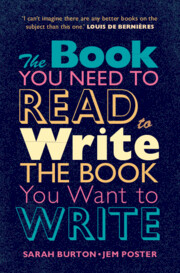Book contents
- Reviews
- The Book You Need to Read to Write the Book You Want to Write
- The Book You Need to Read to Write the Book You Want to Write
- Copyright page
- Dedication
- Contents
- Preface
- Acknowledgements
- – 1 – Getting started
- – 2 – Memory and imagination
- – 3 – Character
- – 4 – Plot and structure I
- – 5 – Plot and structure II
- – 6 – Form and length
- – 7 – Dialogue
- – 8 – Narrative viewpoint and narrative voice
- – 9 – Beginnings and endings; tension and pace
- – 10 – Description
- – 11 – Research
- – 12 – Drawing it all together
- – 13 – Publication and the writing life
- Notes
- Select bibliography
- Index
– 1 – - Getting started
Published online by Cambridge University Press: 17 February 2022
- Reviews
- The Book You Need to Read to Write the Book You Want to Write
- The Book You Need to Read to Write the Book You Want to Write
- Copyright page
- Dedication
- Contents
- Preface
- Acknowledgements
- – 1 – Getting started
- – 2 – Memory and imagination
- – 3 – Character
- – 4 – Plot and structure I
- – 5 – Plot and structure II
- – 6 – Form and length
- – 7 – Dialogue
- – 8 – Narrative viewpoint and narrative voice
- – 9 – Beginnings and endings; tension and pace
- – 10 – Description
- – 11 – Research
- – 12 – Drawing it all together
- – 13 – Publication and the writing life
- Notes
- Select bibliography
- Index
Summary
Addressing the barriers we put in the way of our writing. The need to be prepared to experiment: all landmark fiction has tried something that hasn’t been tried before. Understanding that ‘failure’ is part of the learning process. Don’t listen to inhibiting inner voices: there is nothing you’re not allowed to write and you can always edit later. Allow yourself substandard drafts – then you have something to build on.
‘Accept the difficulties, expect things to be initially unsatisfactory, and start writing.’
- Type
- Chapter
- Information
- The Book You Need to Read to Write the Book You Want to WriteA Handbook for Fiction Writers, pp. 1 - 6Publisher: Cambridge University PressPrint publication year: 2022

